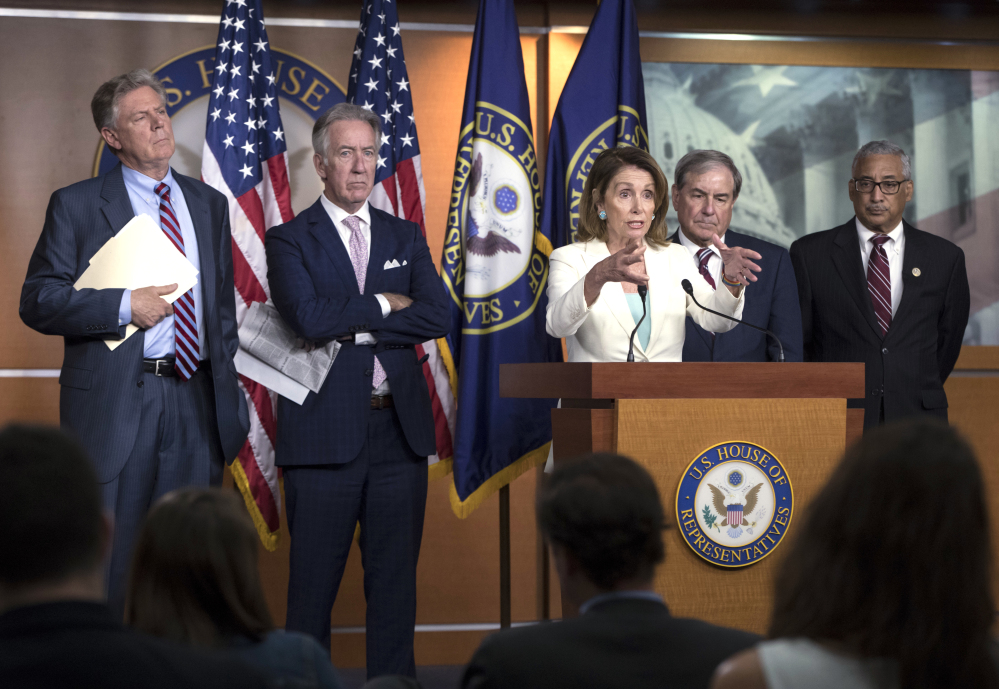WASHINGTON – A revised Republican health care bill would drive up the number of uninsured Americans by 22 million by 2026, the Congressional Budget Office estimated Thursday in a report unlikely to help Republican leaders persuade their party’s senators to back the reeling legislation in an upcoming showdown vote.
An earlier projection by Congress’ nonpartisan budget analysts on the initial version of the Republican legislation projected the same number of people losing coverage. That figure has already been proven to be enough to make some Republican senators unwilling to support the legislation.
The reworked bill would increase average premiums over the next two years, but reduce them starting in 2020 by 30 percent, the report estimated. But the policies would typically offer less coverage.
And because the Republican measure would also eliminate federal subsidies that let insurers lower out-of-pocket costs for low-earners, the changes “would contribute significantly to a decrease in the number of lower-income people with coverage,” the budget office said.
The report was released a day after President Trump spurred Republican senators to resume trying to resuscitate their bill erasing and replacing much of President Obama’s health care law.
White House officials and Senate leaders have been suggesting new changes aimed at winning over Republicans, but there’s no evidence so far that those efforts have worked. Senate Majority Leader Mitch McConnell, R-Ky., has said he wants a vote on the legislation next week.
The budget office’s new estimate does not include the impact of the most important change McConnell made in the legislation in an attempt to gain votes from conservatives. Language added by Sen. Ted Cruz, R-Texas, would let insurers sell low-premium policies with minimal coverage, an option he and his supporters say would drive down premiums.
The coverage impact of Cruz’s proposal is unclear. Many think it would increase the number of healthy people buying policies, but drive down the number of consumers with serious pre-existing conditions who could afford to purchase coverage.
McConnell’s other changes included adding $45 billion to help states combat the abuse of drugs including opioids, extra money to help insurers curb cost increases and retention of tax increases Obama’s law aimed at higher-income people.
Republican leaders’ effort to win support for their bill may face even longer odds because of Sen. John McCain’s jarring diagnosis of brain cancer.
Nursing a slender 52-48 majority, McConnell has been unable to muster the 50 votes he’d need to approve his party’s health care overhaul. Vice President Mike Pence would cast the tie-breaking vote.
But with McCain, R-Ariz., receiving treatment back home for an uncertain period of time, McConnell’s numerical advantage has dwindled. In McCain’s absence, if just two Republicans defect it would sink Trump’s and the Republicans’ banner legislative priority, and more than that have said they are ready to do so.
After a face-to-face lecture from Trump, around two dozen Republican senators staged a nearly three-hour bargaining session Wednesday night to resolve their disputes. When it was over, none offered specific examples of any progress.
Also attending Wednesday’s private meeting were health secretary Tom Price and Seema Verma, the Medicaid and Medicare administrator. It was interrupted by prayer after the lawmakers learned that McCain, 80, had a cancerous brain tumor.
Earlier Wednesday at the White House, Trump told them they must not leave town for their August recess without sending him an “Obamacare” repeal bill to sign.
Earlier in the week, the latest Senate Republican health care plan collapsed, leading Trump to call for simply letting Obama’s law fail.
McConnell indicated he was prepared to stick a fork in the Republican bill and move on to other issues including overhauling the tax code. But plunging into the issue after a period of lackadaisical involvement, Trump pressured McConnell to delay the key vote until next week, and he invited Republican senators to the White House for lunch.
There, with the cameras rolling in the State Dining Room, Trump spoke at length as he cajoled, scolded and issued veiled threats to his fellow Republicans, all aimed at wringing a health care bill out of a divided caucus that’s been unable to produce one so far.
McConnell has failed repeatedly to come up with a bill that can satisfy both conservatives and moderates in his Republican conference. Two different versions of repeal-and-replace legislation fell short of votes before coming to the floor, pushing him to announce Monday night that he would retreat to a repeal-only bill that had passed Congress when Obama was in office.
But that bill, too, died a premature death as three Republican senators announced their opposition on Tuesday, one more than McConnell can lose in the closely divided Senate. Further complicating that approach, the Congressional Budget Office released an analysis Wednesday reaffirming its earlier findings that the repeal-only bill would mean 32 million additional uninsured people over a decade and average premiums doubling.
Send questions/comments to the editors.


